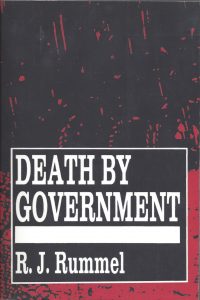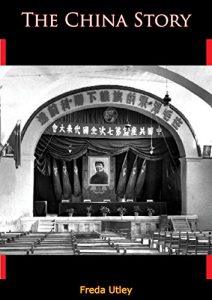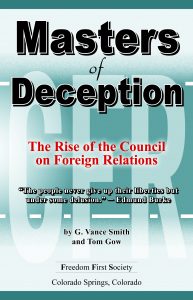In the January/February 2020 Foreign Affairs, Fareed Zakaria, Council On Foreign Relations (CFR) heavyweight and former editor of its Foreign Affairs, argues against a policy of active confrontation with Communist China. His lengthy article concludes with:
China presents a new and large challenge. But if Washington can keep its cool and patiently continue to pursue a policy of engagement plus deterrence, forcing China to adjust while itself adjusting to make space for it, some scholar decades from now might write about the United States’ not-so-secret plan to expand the zone of peace, prosperity, openness, and decent governance across the globe — a marathon strategy that worked. [Emphasis added.]
In support of his conclusion, Zakaria brazenly distorts history — largely through deceptive omission and by relying on Establishment sources pushing the same distortions. As an aside, promoting “decent governance across the globe” has never been a CFR objective!
Since the CFR has achieved dominant influence over our government, it is worth examining what Foreign Affairs covers up in Zakaria’s “The New China Scare — Why America Shouldn’t Panic About Its Latest Challenger.” Actually, America should panic about the influence of the CFR!
Cover-up #1: How China Fell Under Communism
Zakaria’s analysis cleverly ignores the fact that U.S. policymakers, combined with CFR influence, enabled the Communists to take over China, turning China into an adversary. Why did they do so? Major reasons: The CFR’s drive to establish world government needs conflict as a pretext for change, and a Communist government, already dominating its population, would, at some point, be easier to integrate.
We documented that history in Masters of Deception — The Rise of the Council on Foreign Relations. Here is an excerpt:
[I[n early 1946 the Nationalist forces [under U.S. ally Chiang Kai-shek] had Mao’s Reds on the run. However, Truman had sent General George C. Marshall to China to mediate the fighting, and Marshall forced Chiang to accept a cease-fire (one of several). As recorded by Freda Utley:
“In the interval that followed, General Marshall and President Truman took steps to prevent the Nationalist forces from obtaining arms and ammunition. At the end of July 1946 General Marshall clamped an embargo on the sale of arms and ammunition to China….”
Marshall would boast: “As Chief of Staff I armed 39 anti-Communist divisions, now with a stroke of the pen I disarm them.” Stockpiles of arms on their way to Chiang were actually destroyed in India. The Soviets, meanwhile, equipped Mao with vast stores of U.S. military supplies Truman had provided Stalin for the assault on Japan….
On January 25, 1949, John F. Kennedy, a young second-term congressman from Massachusetts, rose on the floor of the House of Representatives to protest the actions of his party’s president:
“Mr. Speaker, over this weekend we have learned the extent of the disaster that has befallen China and the United States. The responsibility for the failure of our foreign policy in the Far East rests squarely with the White House and the Department of State. The continued insistence that aid would not be forthcoming, unless a coalition government with the Communists were formed, was a crippling blow to the National Government.”
A few days later, he would summarize his protest in words that could be applied to the future handling of Vietnam: “What our young men had saved, our diplomats and our President have frittered away.”
But the policies that betrayed the Chinese people had a much more subversive intent — world tyranny through world government.
In his opening sentence, Zakaria harkens back to 1947 and how President Truman would exaggerate a threat of Communist insurgency in Greece to sell what was to be called the Marshall Plan. And he draws a parallel to stoking exaggerated fears of China today. However, the real deception in the Marshall Plan were its objects — socializing European governments and European unification. As we recorded in Masters of Deception:
At the end of World War II, Congress approved the European Recovery Program (ERP) — a program of massive aid to Europe, popularly known as the Marshall Plan. The Marshall Plan was actually developed by a CFR study group — headed by Charles M. Spofford with David Rockefeller as secretary. Marshall’s name was used to elicit bipartisan support….
Recognizing American political sentiments, however, President Truman cleverly sold the foreign aid as a means to help stop the spread of Communism.
In general, American Insiders have used foreign aid to saddle recipient nations with socialist policies and governments. The ERP certainly followed that pattern. But in Europe the aid was also used to promote European unification. [Regional governments were to be steppingstones to world government, accomplished by masquerading the early steps as mere trade agreements. NAFTA and the USMCA would follow the pattern in this hemisphere. See Chapter 7 Progressive Regionalization.]
Cover-up #2: How Communist China Became a World Power
Zakaria: “Formulating an effective response requires starting with a clear understanding of the United States’ China strategy up to this point. What the new [ostensible, public] consensus misses is that in the almost five decades since U.S. President Richard Nixon’s opening to Beijing, U.S. policy toward China has never been purely one of engagement; it has been a combination of engagement and deterrence.
“In the late 1970s, U.S. policymakers concluded that integrating China into the global economic and political system was better than having it sit outside it, resentful and disruptive. But Washington coupled that effort with consistent support for other Asian powers—including, of course, continued arms sales to Taiwan. That approach, sometimes described as a “hedging strategy,” ensured that as China rose, its power was checked and its neighbors felt secure.”
Obviously, a much stronger check would have been not to have enabled the Communist takeover of China in the first place! But beyond that, Washington, in line with the policy of CFR elites, has enabled Communist China to become an economic powerhouse and a credible military threat.
Here are examples of that assistance, using excerpts from Masters of Deception:
- In 1967, presidential candidate Richard Nixon wrote “Asia After Vietnam” for Foreign Affairs, in which he advocated opening diplomatic relations with Communist China. After his election victory the following year, Nixon tapped numerous CFR members to fill key positions in his administration — including Henry Kissinger, who would implement this next step in the continuing Insider betrayal of the Chinese people.
- [Winston] Lord had accompanied Kissinger on his secret trip to Beijing in 1971. Lord would join the CFR in 1973 and serve as its president between 1977 and 1985.
Nixon thus began a U.S. policy spanning several administrations of building Red China into a modern world power. Favored U.S. firms were encouraged to invest in China, even relocating operations to China where they could operate more profitably, with their investments protected by the U.S. government.
The Insider-created policy toward China contributed to the de-industrialization of this country, while also providing a “carrot” (reinforced by U.S. regulatory “sticks”) to encourage manufacturing flight. The result has been a significant erosion of the American middle class. Cheaper goods in the stores haven’t offset declining opportunities for quality jobs.
- Ever since Nixon opened trade relations with China, the CFR has promoted massive transfers of capital and technology to the Red regime, helping it to become a new “superpower,” while decimating America’s industrial and manufacturing capacity.
On August 30, 1982, President Reagan signed a determination that “it is in the national interest for the Export-Import Bank of the United States to extend a credit and guarantee in the aggregate amount of $68,425,000 to the People’s Republic of China in connection with its purchase of steel making equipment and related services.”
- For decades, the U.S. government under a watchful American public had refused Communist demands to recognize Red China as the legitimate government of all China, including Taiwan.
However, the handwriting was on the wall. The ascendancy of Communist power in China had been supported from the beginning by CFR elites. In 1971, the ROC was forced out of the UN, and its seat as a permanent member of the Security Council was given to Communist China.
In December of 1978, President Carter announced on national television that the U.S. would be extending diplomatic recognition to the Communist Peking regime and withdrawing formal diplomatic recognition from our ally on Taiwan. President Carter proceeded unilaterally to cancel our treaties with Taiwan, including the Sino-American Mutual Defense Treaty.
- When President Jimmy Carter severed all diplomatic ties with the Republic of China on Taiwan, Ronald Reagan correctly termed the action an “outright betrayal of a close friend and ally.” However, as president, Reagan made no effort to reverse the Carter betrayal, and U.S. trade with the Red regime continued to increase.
Moreover, in August 1982, Reagan issued a joint communiqué with Peking stating that the U.S. “does not seek to carry out a long-term policy of arms sales to Taiwan.” Adding insult to injury, in 1986, the Reagan administration got Congress to approve the sale of $560 million in advanced electronics to Red China, giving its fighters an all-weather capability superior to Taiwan’s.
Cover-up #3: Communist Genocide in China
Zakaria: “Let’s be clear: China is a repressive regime that engages in thoroughly illiberal policies, from banning free speech to interning religious minorities. Over the last five years, it has intensified its political control and economic statism at home. Abroad, it has become a competitor and in some places a rival of the United States. But the essential strategic question for Americans today is, Do these facts make China a vital threat, and to the extent that they do, how should that threat be addressed?”
Let’s really be clear. Let’s not cover up mass murder and genocide with weak phrases such as “illiberal policies” and “intensified its political control and economic statism.” The estimates of the death toll from Communist genocide in China in consolidating Communist control have varied widely. But Professor R. J. Rummel of the University of Hawaii provided a conservative estimate — more than 35 million deaths — approximately one of every 20 Chinese!
Zakaria: “As far as China’s political development is concerned, the verdict is unambiguous. China has not opened up its politics to the extent that many anticipated; it has in fact moved toward greater repression and control. Beijing’s gruesome treatment of the Uighurs in Xinjiang, a region in northwestern China, has created a human rights crisis. The state has also begun to use new technologies, such as facial recognition software and artificial intelligence, to create an Orwellian system of social control. These realities are a tragedy for the Chinese people and an obstacle to the country’s participation in global leadership. It would be an exaggeration, however, to adduce them as proof of the failure of U.S. policy.”
But China fell under Communist dictatorship precisely because of U.S. policy! Actually, that was not a “failure” of policy as the policy accomplished its subversive purpose.
Cover-up #4: Creation of a Soviet Threat and Cold-War Management
Zakaria: “The consequences of exaggerating the Soviet threat were vast: gross domestic abuses during the McCarthy era; a dangerous nuclear arms race; a long, futile, and unsuccessful war in Vietnam; and countless other military interventions in various so-called Third World countries. The consequences of not getting the Chinese challenge right today will be vaster still. The United States risks squandering the hard-won gains [???] from four decades of engagement with China, encouraging Beijing to adopt confrontational policies of its own, and leading the world’s two largest economies into a treacherous conflict of unknown scale and scope that will inevitably cause decades of instability and insecurity. A cold war with China is likely to be much longer and more costly than the one with the Soviet Union, with an uncertain outcome.”
There are so many false claims in those statements that cry out to be challenged. We will focus on one: “a long, futile, and unsuccessful war in Vietnam.”
In our war with North Vietnam, CFR elites ensured that victory was never the goal. From Masters of Deception: “[McGeorge] Bundy’s older brother, William P. Bundy, also CFR, would serve in the Johnson administration as assistant secretary of state for Far Eastern affairs (1964–1969), playing a major role in “mismanaging” the war in Vietnam. William would later become a director of the CFR and the editor of Foreign Affairs.”
Also from Masters:
Throughout the Vietnam War, [President] Johnson met periodically with an advisory group of 14 he himself called “the Wise Men.” Twelve of the fourteen were CFR members. Dean Acheson was perhaps most influential. John J. McCloy, Robert Lovett, and Averell Harriman were also included.
• No-Win War. The War in Vietnam was not a project of anti-Communist “hawks,” but of CFR “wise men,” who had helped and would continue to help Communism….
In Vietnam, McNamara and company hobbled our Armed Forces with a defensive strategy that could not win, while preventing a strategy that could. Americans have been repeatedly told that winning was not feasible. Yet few are aware of counterclaims by America’s top military leaders….
In late 1966, former Air Force Chief of Staff, General Curtis LeMay, fed up with the Administration’s “nibbling around the edges” strategy, which was unnecessarily sacrificing thousands of lives and scores of billions of dollars, published an outspoken article in U.S. News & World Report, offering a blueprint of the Air Force-sea power strategy for victory….
But such an objective was contrary to the firm intentions of the Insiders running the war. Even worse, the McNamara team invoked an insidious micromanagement of the war from Washington and imposed Rules of Engagement that ensured our forces could not have victory. They would win every major battle, but were not allowed to win the war.
Cover-up #5: The UN is a CFR Creation for World Domination
Zakaria: “In the early 1970s, before Nixon’s opening to China, Beijing was the world’s greatest rogue regime….
“By comparison, today’s China is a remarkably responsible nation on the geopolitical and military front. It has not gone to war since 1979. It has not used lethal military force abroad since 1988. Nor has it funded or supported proxies or armed insurgents anywhere in the world since the early 1980s. That record of nonintervention is unique among the world’s great powers. All the other permanent members of the UN Security Council have used force many times in many places over the last few decades — a list led, of course, by the United States.
“China has also gone from seeking to undermine the international system to spending large sums to bolster it. Beijing is now the second-largest funder of the United Nations and the UN peacekeeping program. It has deployed 2,500 peacekeepers, more than all the other permanent members of the Security Council combined. Between 2000 and 2018, it supported 182 of 190 Security Council resolutions imposing sanctions on nations deemed to have violated international rules or norms.” [Emphasis added.]
Here Zakaria esteems the decisions of the CFR’s emerging UN tyranny, a collection of largely despotic governments, as “international rules or norms.”
Zakaria also implies that a regime willing to use lethal force at home (e.g., the 1989 Tiananmen Square massacre) may somehow be unwilling to use it abroad. And he conveniently ignores the continued brutal occupation of Tibet.
In his newspaper column, CFR-heavyweight Henry Kissinger described the Tiananmen Square massacre as “inevitable,” insisting that “[n]o government in the world would have tolerated having the main square of its capital occupied for eight weeks by tens of thousands of demonstrators….”
Within a few weeks of that massacre, U.S. officials Lawrence Eagleburger (formerly of Kissinger Associates) and Brent Scowcroft (former chairman of the CFR’s membership committee) would travel to China to reassure the Chinese leaders of continued U.S.-Chinese relations.
The fact that Red China has embraced the CFR’s international system and its plan for world subjugation is no joy, as the following excerpts from Masters of Deception illustrate:
- The original proposal for a specific United Nations was developed under the leadership of Secretary of State Cordell Hull. In January 1943, Hull formed a “secret steering committee,” later known as the Informal Agenda Group, to come up with a specific proposal. In addition to Hull, the steering committee included Leo Pasvolsky, Isaiah Bowman, Sumner Welles, Norman Davis, and Myron Taylor — all but Hull CFR members.
The UN’s trappings of democracy are merely a sham to deceive the public. In reality, the UN is controlled by a hidden oligarchy relying heavily on the CFR.
- The hierarchical structure of the UN facilitates that control. The UN and its agencies are structured so that controlling a number of key spots at the top is sufficient to control the entire beast. And the CFR and its Communist children have made sure that their agents occupy key posts in the apparatus.
In summary, Zakaria’s article gives support to liberal sophistry regarding the moral equivalence of governments. More significantly, it helps justify relying on the UN’s handpicked tyrannies to police the world. But his article, with our critique, can also be used by our readers to help others understand the ruthless masters of deception who would steal our freedom.


